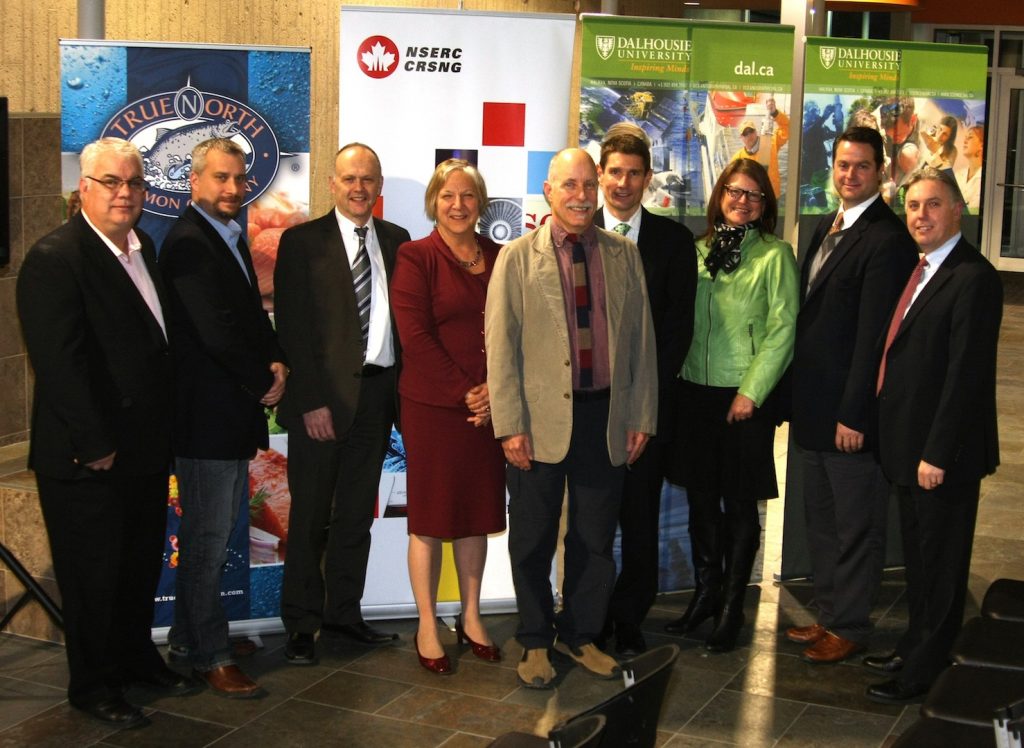
Research Chair to focus on aquaculture sustainability
January 3, 2014
By Erich Luening
 Left to Right: Jeff Nickerson - Nova Scotia Saltwater Production Manager Cooke; Michael Szemerda - VP Saltwater Operations Cooke; Dr. Chris Moore - Dean of Science Dalhousie University; Dr. Martha Crago – VP Research Dalhousie University; Dr. Jon Grant – NSERC Cooke Industrial Research Chair; Dr. Richard Isenor - Atlantic Manager NSERC; Nell Halse – VP Communications Cooke; Andrew Lively – Director Marketing Cooke; Ross Butler – Senior VP Cooke. New Brunswick-based Cooke Aquaculture has formed a partnership with the Natural Sciences and Engineering Research Council of Canada (NSERC) and Dalhousie University to create the Cooke Industrial Research Chair in Sustainable Aquaculture.
Left to Right: Jeff Nickerson - Nova Scotia Saltwater Production Manager Cooke; Michael Szemerda - VP Saltwater Operations Cooke; Dr. Chris Moore - Dean of Science Dalhousie University; Dr. Martha Crago – VP Research Dalhousie University; Dr. Jon Grant – NSERC Cooke Industrial Research Chair; Dr. Richard Isenor - Atlantic Manager NSERC; Nell Halse – VP Communications Cooke; Andrew Lively – Director Marketing Cooke; Ross Butler – Senior VP Cooke. New Brunswick-based Cooke Aquaculture has formed a partnership with the Natural Sciences and Engineering Research Council of Canada (NSERC) and Dalhousie University to create the Cooke Industrial Research Chair in Sustainable Aquaculture.New Brunswick-based Cooke Aquaculture has formed a partnership with the Natural Sciences and Engineering Research Council of Canada (NSERC) and Dalhousie University to create the Cooke Industrial Research Chair in Sustainable Aquaculture.
The five-year renewable program at Dalhousie University will be led by Oceanographer Dr. Jon Grant, with funding for the Chair and associated research provided by the partners. Research will focus on simulation modeling for maintaining coastal ecosystem services, as well as the integrity of cages and moorings for bio-security.
The Chair’s mandate will also include: waste-management plans “for environmental integrity;” the assessment of sediment habitat health; prevention of disease and management of fish health; and marine spatial planning of aquaculture and wild fisheries.
The statement released by the three partners notes that the new Chair will provide a “world-class platform” for ecosystem-based research and for “expertise that is required to grow a sustainable aquaculture sector in Nova Scotia.”
Cooke will contribute $160,000 a year for the five years, for a total of $800,000, to match the NSERC contribution.
The company will also contribute in-kind resources – specifically boat and diver costs – and will also provide employment opportunities in the short term and long term as graduates complete their research programs.
Dalhousie says its capacity for aquaculture education will escalate “significantly” as a result of the partnership. Both university and industry representatives are cited as saying the partnership will lead to an even more qualified workforce, as well as opening “a new chapter” in the practice of environmentally responsible fish farming.
– Quentin Dodd





